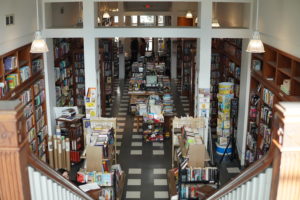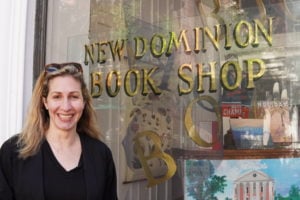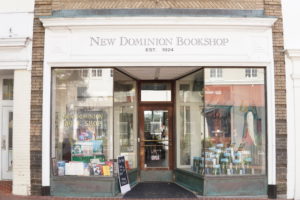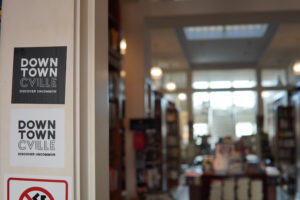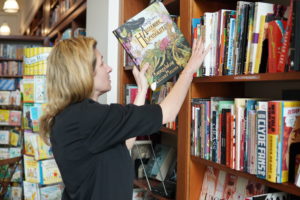A chat with Julia Kudravetz from Charlottesville’s New Dominion Bookshop
What do a book shop and real estate brokerage have in common? More than you think – competing in the internet economy, building community, and a lot more.
Jonathan, Keith and I have talked for a while about the rise in independent bookstores (NYTimes, American Booksellers Association, NPR). The recent Rework podcast, Nevermore, Amazon, was the catalyst to reach out to Charlottesville’s independent new book shop, New Dominion Book Shop, which is the only new book store in Charlottesville other than Barnes and Noble.
You can listen to the podcast here, and subscribe to the podcast here.
If you enjoy our podcast, please share it with a friend or colleague, and rate us wherever you listen to podcasts!
Highlights of our Conversation
- Julia’s story about how she came to buy New Dominion Bookshop
- How and why she spearheads so many community events
- Transitioning a long-existing brand to a new era
- Ryan Raffaelli’s Harvard Business School’s study, How Independent Bookstores Have Thrived in Spite of Amazon.com
- Community, Curating, Convening
- How her client base and demographics have shifted
- Balancing being in different communities
- Amazon. The elephant in the room, and undercutting prices
- The practice of showrooming
- The value of humanity, personal experience and recommendations
- “Does Amazon do real estate?”
- Rework’s podcast
- Value of having an amazing retail storefront and how that affects and impacts her business
TRANSCRIPT
Jim:
This is Jim Duncan with Nest Realty on Sweat The Details. Keith, Jonathan and I had a great conversation with Julia Kudravetz from the New Dominion Bookshop on Charlottesville’s Downtown Mall. What do a bookshop and a real estate brokerage have in common? More than you think, competing in the internet economy, building community and a lot more. Hope you enjoy the conversation.
Jonathan:
Welcome to Sweat the Details. We’re here with Julia Kudravetz from the New Dominion Bookshop in Charlottesville, Virginia. Welcome to Sweat The Details.
Julia:
Thank you.
Jonathan:
Thanks for coming in. So I guess first of all, I’d like to just pass the baton to you and have you tell us a little bit about how you got into the business of owning a bookstore and a little bit about New Dominion.
Julia:
Okay. I think like any story of how you got somewhere, a lot of different things all led me to this. The shop itself is from 1924, so it’s one of the oldest independent bookstores in the country and it was started by a man named Christopher Columbus Wells who was a ambulance driver, I think, in maybe World War I. Came back to Charlottesville and started it and it moved. It’s been in several locations, but now, it’s on 4th Street on the Downtown Mall. Carol Troxell owned it for about 30 years. And when I moved back to Charlottesville in my early 30s, I think I was trying to replicate an experience I’d had in the big city and I started a reading series. So bringing poets and fiction writers to town to read their work in sort of a social, fun environment. And I held this over at an art space in Belmont. And when authors had a book, they’d want to sell that book. So I went to Carol and I said, “Can we sell books at this reading series?”
Julia:
And so I ended up selling New Dominion Bookshops at these Friday night readings. That led to doing their social media, which at that time was that I did the Facebook and I did the Instagram, it was not rocket science. And I was teaching at the community college here, teaching English Composition when she passed away. And we weren’t sure what was going to happen with the shop and I asked her husband if he would hire me as the manager with the idea that I could buy the shop someday. I had talked to Carol a little bit about buying it, but I didn’t know it was going to happen at this time in my life. I thought maybe a few years down the road. So I spent about eight months managing and then I bought the shop. So I’ve owned it for two years now. So it’s a little bit like captaining a large ship that’s been moving for a long time.
Jonathan:
Right. So tell me about that transition. How was that transition from managing to owning the shop?
Julia:
Well, I enjoy working for myself very much. Even if I’m putting in longer hours and maybe paying myself a little less, I feel that I’m responsible for my own destiny. And I’ve hired a lot of young folks, a lot of UVA students, just a younger and more diverse group of booksellers and I feel a lot of responsibility to them, to pay them a living wage. And so those things keep me up at night, but overall, I love having my own business. I don’t think I could go back to working for the man.
Jonathan:
How is it to take on basically a brand that’s been around for a long time? And you’ve taken it on. What’s been the thought process over the last two years about how you take a brand that’s been existing and it’s well known in the area and the region and continue to push it forward?
Julia:
That’s a great question. And I did not go to business school, I went to graduate school in creative writing. So obviously, thinking about branding and business branding and business growth, it’s something I have sort of felt my way through. When you start something from scratch, you’re really pushing the rock up the hill, and I had a lot to live up to in terms of the reputation in the community for it. So we have a lot of goodwill towards the shop. I think what I’ve done or what I’ve tried to do is that it was primarily a retail store that had and has, a wonderful gardening section, an art section, wonderful landscape architecture, but it was primarily retail. It was open until 5:30 at night and then closed.
Julia:
What I’ve tried to do is make it more of a center for literature and culture. So we have now, it’s amazing when I count, almost 150 events a year. And that includes the Festival of the Book in March. And so we bring authors to come do readings, do signings, and that builds the brand, so to speak, but it also brings in people to have an experience where they meet an author, get a signed book, meet other people who love books and literary culture here in Charlottesville. So that’s I think one of the ways that I’ve tried to shift it from something that’s pure retail into more of… I always joke that I’m running a nonprofit. In some ways, I absolutely am running a nonprofit, but that I’m trying to make it a place where you can come hear a concert, hear someone read poetry, see UVA students perform scenes from Shakespeare on our stairs. We do all kinds of things.
Keith:
Julia, of the 150 annual events you’re hosting, how many of those are you all doing in the shop and how many of them are you doing offsite? I mean, the Festival of the Book obviously is a enormous undertaking and is not all taking place in the New Dominion, but…
Julia:
I couldn’t give you an exact breakdown. When we have authors who might bring more than 70 people, we’ll have it offsite. We have the Paramount Theater and the historic theater on the Downtown Mall, holds a thousand people. We rented that recently to have Michael Lewis come speak in conversation with John Grisham. And we’ve also had John Meacham come. We’re about to have a prominent scientist named Brian Greene come in February. So that’s for really, really large readings. We also do private book parties, book launches. We will go places, go other places, go to breweries where people are having a book launch. But most of it is in the shop. The shop is large and I like to think it’s gorgeous and I like to pack people in there. So if they’re sitting there listening, they zone out and they see a book on the shelf they like-
Jim:
The shop’s beautiful. I’m looking forward to the photographs we’re going to put up on the blog post that goes with this because you’ve really got to see. I mean, the stairs are extraordinary and the windows in the back of the shop are tremendous.
Julia:
There’s also a 30-year-old fully mature rose garden in the back, which is another thing I inherited. The roses all have the names of Belgian kings and queens, and we’ve had people get married out there, just as the peace kind of stuff.
Jonathan:
Right.
Julia:
Yeah.
Jonathan:
It is an iconic spot. Something that when you walk in there, you can envision being in a movie when you’re in there, so it is a great spot. Take a quick side note here, our listeners may be wondering why are we focused in on independent bookstores and breweries and some different things while we’re a real estate company. But I think one of the impetuses for this conversation was a Harvard Business School study that was done a couple of years ago by Professor Ryan Raffaelli. And he did a study that looked at independent bookstores and the gist of it was that independent bookstores between 2011 and now have increased over 35% in the country, which is really the opposite of what we would think that to happening. With the rise back in the 2007, 2008, 2009 timeframe with Borders and Amazon and the birth of the internet, a lot of people really called A, for the death of retail and B, the independent bookstore and some other industries out there just wouldn’t be able to survive.
Jonathan:
So it was a fascinating study that we read and that we’ve been looking at from a brand perspective. And really, he pinpointed three things. One is that these bookstores focused on community and being part of that community. The second, that they curated and they didn’t try to serve everybody, it’s kind of that whole long tail philosophy that you try to serve a kind of a specific niche in the market. And the third is convening, which goes to the idea of you having a 150 events. In the study that he did, he found some bookstores that did upwards of 500 events that really just brought people in book signings.
Julia:
That’s exhausting.
Jonathan:
Right? That does sound exhausting. We do a couple events a year through Nest Realty and I think we maxed our time from that. So he calls them in the study three Cs, community, curation and convening. So that’s a little bit of a foundation for why we’re having this conversation today.
Keith:
Well, in our prep conversation, you said that you had seen increased sales year over year. And it sounded like it was a marked increase. Do you attribute that to the event, to building of your social media? Where do you see that being driven from?
Julia:
And I think everyone would like to take full credit. I would like to take full credit for this. I think I came in at a good time as well. It’s a good time for independent bookstores. I think people are tired of going to the big box stores and they realize the limits of online commerce. So that is certainly something. We are the one bookstore that held on when the other stores, big stores came in. So timing, I think, you can never measure how much timing works into it.
Julia:
I think having a great young staff has been really helpful. And I think the Downtown Mall continuing to be like a vibrant place where people go to eat dinner, to go to shows, to shop has helped a great deal. I used to close at 5:30 now I close at 9:00 on the weekends and on Thursday nights. So you get people downtown, they have dinner, they have a few glasses of wine, maybe they’re on a date and they kind of are wandering around, don’t know what to do. They come in and end up in our poetry section for a long time. And I’m like, “All right, you guys have fun, please buy a book.”
Julia:
But it’s nice to have people come in the evening. I play music and just making it a place that people know it’s open and they can go see the new stuff. But also I think one thing that makes our shop different from some of the newer indies is what we have. We have 20,000 books. It sounds like a lot, but it’s certainly not everything the way you’d find one of these huge stores. But we have a lot of the classics. So you can come in, you see all the new releases and the things you’ve read a wall street journal review of, but we have the great books. I try to make it a place where you’re like, “These are the important books in our culture and things that people are talking about and you can come in anytime of day and browse and find them.
Jim:
What’s one of your favorite events?
Julia:
One of my favorite events. Of all the ones we’ve ever done?
Jim:
Yeah. Just whatever’s your favorite event this year or the last two years or what has driven your passion for bringing people in?
Julia:
Apples and oranges. Let’s see, I have to say like the paramount events where it’s great to say, “Well I can get a thousand people to come see this author and rent this amazing historic space”, is pretty fantastic. One thing I love is every Thursday night, 8:00 o’clock, the UVA masters of fine arts students in writing come and they read their fiction and poetry and they have a quite a following. That’s a regular thing that they do and it’s great. It’s a great town gown of course. It’s great to get the UVS students into the shop, but it’s a nice community and they take turns introducing one another and they have a good time. We do a stupid raffle every time. It’s fun. So it just depends.
Jim:
So how have you seen the community shift since you’ve owned the store? We looked through the lens of our client base coming from different parts of the country and state, et cetera. Have you noticed that there’s been more from Charlottesville people, or are you seeing that we are seeing in the city more people coming in from other parts?
Julia:
You mean the customers?
Jim:
Yeah.
Julia:
I think it changes seasonally. Because we are a university town, you have a lot of newcomers coming in August, people discovering the shop for the first time, which is really nice to have that continual influx of smart, interesting people and they’re discovering it along with everything else downtown. In the summer we have a lot of international tourists. Germans love to buy John Grisham books, for a reason. So it’s really seasonal who comes into the shop. I am working to get more children and teenagers into the shop to buy books because I feel like those are going to be the next people to hopefully be our customers.
Keith:
So Julia to that note, one of the things that Jonathan [inaudible 00:14:35] was a curation question of how do you specialize and how do you find a focus? And obviously 20,000 books is a heck of a lot of books to have to maintain on inventory. But at the same time it also shapes who comes into your store on a repeated basis. So how do you look forward knowing what you have on your shelves now versus where you want to be in the next few years and how you expect to change that or turn that over? You had said originally it was landscape architecture or gardening and you’re trying to get more into the creative writing side of things.
Julia:
Those were the sections I think that were particularly interesting and strong. Also literary fiction. The whole shop has always had a great selection. I buy from all the major publishers. So the way it works is right now I’m talking to my Penguin Random House sales rep, and I’m looking at the thousand books that are coming out in the spring and deciding which ones to bring into the shop. Some of those are authors who I know and like and would like to bring to the shop, people that I know people in Charlottesville follow or would like to read their next book. Just thinking about the different demographics here and what people like to read. Also if it’s gotten a New York Times’ review, I should probably have it because someone’s going to want it.
Keith:
Sounds reasonable.
Julia:
So that’s how I think buying is certainly there’s an art to it, but I think having grown up here in Charlottesville, I’m aware that there are many, many different Charlottesville’s. And I think one benefit of living here and being a local is that I can be in many different communities at once in a way that I don’t feel like in the big city. It’s like I’m in this like narrow group of like-
Keith:
[crosstalk 00:16:26] have to be a real to be [crosstalk 00:16:27].
Julia:
Yeah, like just all white people in their 30s, and here I have the people I know through my family and people I know through church and the people I know through the bookshop. And all of those communities might have different interests, and in our events we try to bring in authors that will appeal to several, different communities in Charlottesville and hopefully some of them where there’s a real mix and you bring people together.
Jonathan:
I’m going to bring the elephant in the room out. Do you see Amazon as a competitor?
Julia:
Yeah, we try not to say that word.
Jim:
Right. That’s what I figured.
Julia:
Well I think railing against Amazon really won’t get me anywhere. Like complaining about Jeff Bezos, okay, he’s a successful man. I have Amazon Prime. I use Amazon. Some people swear it off. I use it for some things. I don’t think I can ever undersell Amazon. I do get really frustrated when I go on and I see something there for sale for less than it cost me to buy the book. Like, “How can you do this?” And they do it by undercutting the price so much, and then I guess making the money up through ad sales or something. Which seems to me like some kind of shady monopoly behavior, but, okay. I don’t know.
Julia:
I think it does take a big chunk of our business, and I think it will continue to. I don’t have drones, I’m not planning on getting any drones, so we’ll see where that goes. But overall, yeah, it’s a thorn in my side. But I think what we can try to combat that with is the community experience. The fact that people can come in and get a recommendation just through talking to us, we’re not an algorithm. We have signed books, we have books that you might not even know you want unless you find them on the shelf.
Jim:
Right. You can’t touch it on Amazon.
Julia:
Yeah, exactly. But yeah, I have a million stories of people coming in and it’s called show rooming. They’ll see a book that I’ve bought that I’ve decided is good and put out there in the window and they go and they look at it and they chat with me about it and then they take a picture of it. And literally I’ve seen people going to Amazon.
Jim:
Right there.
Julia:
And what are you going to do? Am I going to get mad or I’m just going to say, “All right, well people.”
Jonathan:
I think I saw a story one time where it said that either Amazon or some group was offering a bonus if you were to buy a book in your shop from Amazon. So if you go into your shop and look at it-
Jim:
Sort of geo tag.
Jonathan:
Yeah, they geo tag that picture of that order. So we can’t compete with Amazon. I mean, nobody can compete with Amazon, but from a-
Jim:
Well, maybe you can. I push back and say you can, right? [crosstalk 00:19:24].
Jonathan:
Well, not on price.
Keith:
[crosstalk 00:19:25] is not going to be live on the Amazon website talking about [crosstalk 00:19:29].
Jonathan:
Well, you can’t compete with Amazon on price, but you can compete with them on what you offer.
Jim:
Experience.
Keith:
Everything else.
Julia:
Yes, service and experience. Does Amazon do real estate?
Jim:
They’re about to. [crosstalk 00:19:39] They’re about to do everything. They’re doing real estate now. I get spam calls from them saying, “Join the Amazon team.” And I’m like, “Yeah, I’ve got a team.”
Julia:
Yikes.
Jim:
[crosstalk 00:19:49] So this whole world that we live in today, and I think that there’s this, I mentioned it earlier, this belief in some people’s mind that retail’s dying and you know, there’s malls for sure that aren’t around anymore. But I think bad retail, it doesn’t matter what industry you’re in, probably-
Jonathan:
It’s gone.
Jim:
Mattresses or books or grocery stores, there’s problems on the horizon, if not already. Great retail, if you focus on the experience, it’s the new Dominion Bookshops of the world and it’s a Warby Parker, and some of these other businesses that are really looking at retail as an experience. Whether it’s see, touch, feel, or whether it’s some sort of digital experience when you get the floor, or if it’s just amazing service and knowledge that you can walk in and feel as though that you’re going to get the right advice. I think there’s a huge opportunity to “compete with” with Amazon out there.
Julia:
I’m very lucky that we’re not in a strip mall. Geography is a big part of it. Charlottesville, you all know as real estate agents, one of our big strengths and our big draws is our pedestrian mall, one of the oldest in the country, the bricked-over pedestrian mall. And people come to walk that mall and we get a lot of folks come in just who look in our windows.
Jim:
Right. You’re part of date night. You’re part of the experience and-
Julia:
I am. I’m just in the back and like, “Have fun you guys.” But yeah, I think being on the mall near all the restaurants makes it a great experience for people as well, that it’s part of the downtown cultural community.
Jim:
But I think the humanity factor is something that’s big too. I think that we’re seeing through our real estate lens, but also through retail. I think that people want to come in and ask an expert, and I think you were telling me the other day about how people come in and say, “Help me find a book for a friend.” What is that like?,
Julia:
Sometimes it’s like playing 20 questions. They’ll want something for their father-in-law and like, “Well, tell me about your father-in-law.” And they’ll say, “Well, I don’t know. He doesn’t read very much.” I’m like, “Okay, well what’s something you think he likes?”
Keith:
[crosstalk 00:22:08] a little harder.
Julia:
Yeah, like the example I think I gave you, they were like, “Well, he really likes cars.” I’m like, “Okay, how about this Top Gear book of like the best top gear of all time?” And, “Yes, thank you. This is it.” So it’s kind of fun at Christmas time helping people, especially when they’re in panic mode.
Jim:
[inaudible 00:22:31] matchmaking. I think that we do that in real estate a lot, both with assembling teams and assembling people or matching people with houses. I think it’s matchmaking and luring the person.
Julia:
Yes, it’s talking to them and maybe not always about the book itself, but learning about them and then saying, “Well, what about this?” They are the people who know exactly. They walk in, they’re like, “This is the book I want. This is the author I want.” There are other people who it’s like you don’t know what you don’t know, so they’ll find something. They’re like, “Oh yeah, this is great. I never would have found this.”
Keith:
Well, and the flip side is also from the consumer standpoint, going into an independent bookstore and seeing on the shelves, “This is Julia’s recommendation.” And at some point you realize I really enjoy Julia’s recommendations, that we share similar taste. The same thing with… wine buying is obviously a little bit harder on the internet than books are at this point, but going into a small wine shop, you find the sales people who have your taste, who share the same interest and in New Dominion you’ll find the bookseller who shares the same interests, whose recommendations are always spot on. And you’ll go back to them time and time again. And it makes it easier and more enjoyable to know that you’ve had that shared experience.
Jonathan:
Yeah. There’s no doubt. As I sit here and we have this conversation thinking about the similarities between your business and our business as realtors is we have clients that will look at houses on Zillow from California, think they know exactly what they want, fly out. We’ve got six houses that in many cases, they’ve curated themselves. They go and they don’t like any of them, but we extract that information from them and say, “Well, why don’t you like this? Why don’t you like that?” And in our minds, our realtor’s minds, they start to kind of figure out, “Where should I point them?” Just like you’re figuring out which book you should recommend for their father-in-law.
Julia:
And hopefully they say, “Oh, I wouldn’t have picked this based on the picture, but I’m really glad that you’ve found it.”
Jonathan:
“But thanks for your knowledge.”
Julia:
Yeah.
Jim:
The number of times that I’ve had the client say, “I would not have found this house or this location without… ” Not me guiding them, but just through the dialogue and the conversation that I led them through, it’s a fun experience to have that matchmaking experience.
Jonathan:
Yeah, it’s true. Well, as this podcast is Sweat The Details, you clearly have 20,000 or more details to be sweating on a day. Not just books, but just what’s going on with events and stuff. Tell us what’s that one detail that you sweat on a regular basis that you’re really ultra focused on?
Julia:
Exactly. Picking the one detail. We have a table at the front of the shop and is called the French table and that is because it’s a French antique. That’s the only reason. But on the French table we have new releases and then we have books that we think people walking in the shop would get excited about that are interesting or beautiful, interesting and beautiful. Some that are by local authors, just things that would get people interested in, in looking at the whole shop and certainly things that we we’d like people to buy. So every day I’m trying to… This is the face we show the world and it’s the first thing people see when they walk in. So I try to make that table nice inviting and always have. A book that came out that week, hopefully signed on that table. So that’s something every day I’m like, “How does a French table look? Are there good new books on it?”
jim:
Love it. Another similarity with real estate, curb appeal.
Jim:
It is, yeah. [crosstalk 00:26:15].
Julia:
We got big beautiful windows, we put some books in there. Always a book with dogs. People are like, “Oh.” [crosstalk 00:26:23].
Jim:
We’ve talked about pets in many of these conversations. Well, Julia, thank you so much for being here. We really appreciate it and hope to stay in touch.
Julia:
Thank you for having me.
Jonathan:
Thanks Julia.
Jim:
Hey everybody. We would love your feedback. If you have a response or a question, please take a voice memo on your phone and email it to [email protected]. Thanks, and we look forward to hearing from you.

